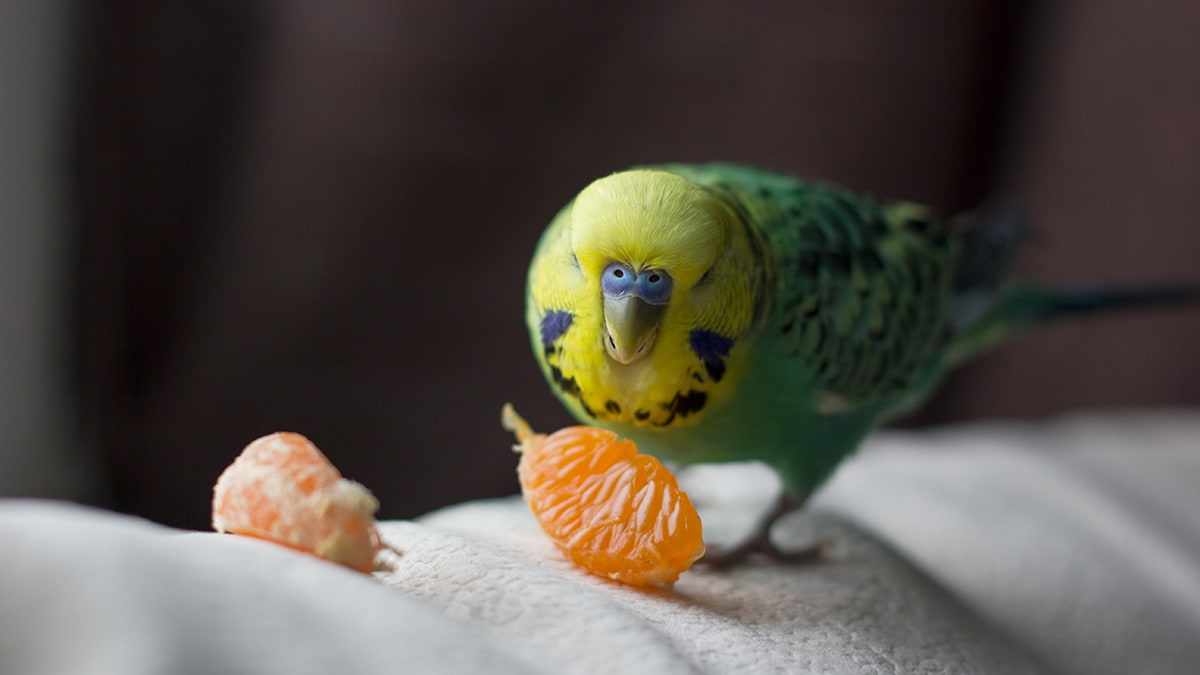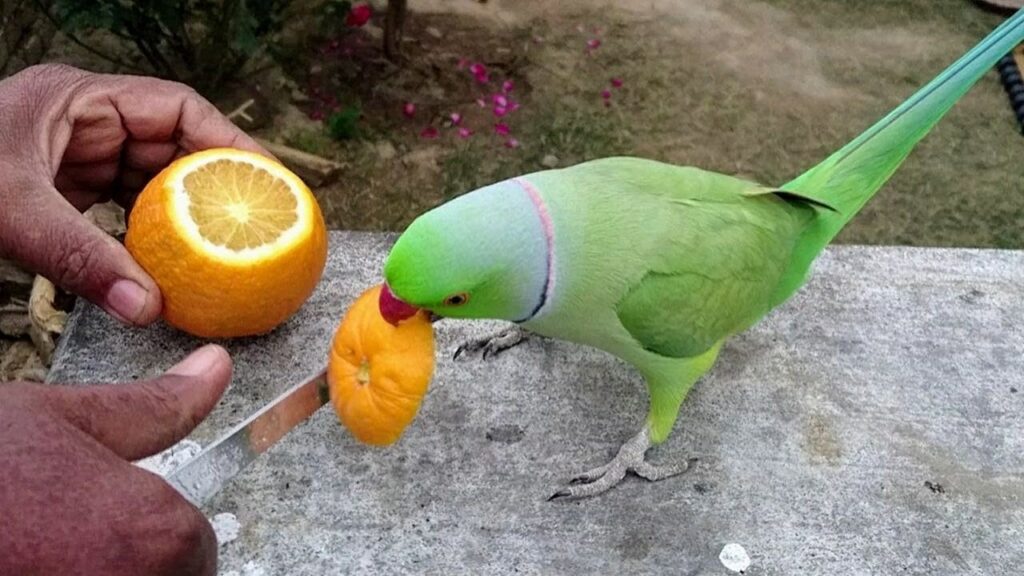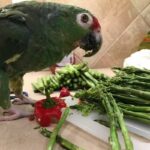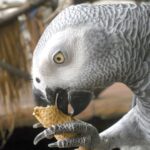Yes, parrots can eat oranges. Oranges provide essential vitamins and hydration for parrots.
Oranges are a healthy and nutritious treat for parrots. They are rich in Vitamin C, which boosts the bird’s immune system. The natural sugars and high water content in oranges help keep parrots hydrated. While offering oranges, ensure they are fresh and properly washed.
Remove any seeds as they can pose a choking hazard. Moderation is key to maintaining a balanced diet. Overfeeding citrus fruits can lead to digestive issues. Offering a variety of fruits ensures that parrots get a well-rounded diet. Always consult a vet for personalized dietary advice for your parrot. Keep your feathered friend healthy with occasional orange treats.
Parrots And Oranges
Parrots are curious eaters and love exploring new foods. Oranges are bright, juicy fruits that many parrot owners ask about. But can parrots eat oranges safely? Let’s explore this topic in detail.
Nutritional Content Of Oranges
Oranges are packed with essential nutrients. They are rich in vitamin C, which supports the immune system. Fiber in oranges aids digestion. They also contain vitamin A, calcium, and potassium.
| Nutrient | Benefit |
|---|---|
| Vitamin C | Boosts immune system |
| Fiber | Improves digestion |
| Vitamin A | Supports vision |
| Calcium | Strengthens bones |
| Potassium | Regulates blood pressure |
Parrots’ Natural Diet
In the wild, parrots eat a variety of foods. Their diet includes fruits, seeds, nuts, and vegetables. This diverse diet helps them get all necessary nutrients.
Oranges can be a part of a parrot’s diet. They provide vitamins and hydration. But always serve oranges in moderation.
- Wash oranges thoroughly to remove pesticides.
- Remove seeds and peel to avoid choking hazards.
- Offer oranges as a treat, not a main food source.
Following these guidelines ensures your parrot enjoys oranges safely.
Health Benefits
Oranges are not just tasty; they offer many health benefits for parrots. These fruits are packed with essential nutrients that can help your feathered friend thrive. Let’s explore the health benefits of feeding oranges to parrots.
Vitamin C Boost
Oranges are rich in Vitamin C, which is crucial for parrots. This vitamin helps to strengthen their immune system. A strong immune system keeps your parrot healthy and active.
| Benefits of Vitamin C |
|---|
| Boosts immune function |
| Helps in healing wounds |
| Supports skin health |
Antioxidants And Immune Health
Oranges are loaded with antioxidants. These compounds fight free radicals in the body. Free radicals can cause cell damage and health issues.
By eating oranges, parrots get a good supply of antioxidants. This strengthens their immune system further. A strong immune system means fewer illnesses for your pet.
- Fights free radicals
- Protects cells from damage
- Enhances overall health
Digestive Health
Understanding the impact of oranges on a parrot’s digestive health is crucial. Oranges offer several benefits that can support a parrot’s digestive system. Let’s explore the aspects of fiber content and digestive enzymes.
Fiber Content
Oranges are rich in dietary fiber, which is essential for a parrot’s digestive health. Fiber helps to regulate bowel movements and prevent constipation. It also aids in maintaining a healthy gut microbiome.
Here is a quick breakdown of the benefits of dietary fiber:
- Improves digestion
- Prevents constipation
- Maintains gut health
- Supports nutrient absorption
Digestive Enzymes
Oranges contain natural digestive enzymes like bromelain and papain. These enzymes help break down food, making it easier for parrots to digest. This can lead to better nutrient absorption and overall health.
Here’s a table summarizing the key digestive enzymes in oranges:
| Enzyme | Function |
|---|---|
| Bromelain | Helps break down proteins |
| Papain | Assists in protein digestion |
Incorporating oranges into a parrot’s diet can thus be highly beneficial. Always ensure to feed them in moderation to avoid any digestive issues.

Credit: blog.parrotessentials.co.uk
Energy And Hydration
Parrots need proper energy and hydration to stay healthy. Oranges can help with both. This section will explain how oranges benefit parrots. Let’s look at the natural sugars and water content in oranges.
Natural Sugars
Oranges are full of natural sugars. These sugars give parrots quick energy. Parrots are active and need this energy boost. Natural sugars are healthier than processed sugars.
- Oranges have fructose, a natural sugar.
- Fructose helps parrots stay energetic.
- It supports their playful behavior.
Too much sugar can be bad. Give oranges in small amounts. This keeps your parrot healthy and happy.
Water Content
Oranges have high water content. This helps keep parrots hydrated. Proper hydration is vital for their health. Dehydration can lead to serious problems.
- Oranges are about 86% water.
- This water helps in digestion.
- It also keeps their feathers shiny.
Hydration from oranges helps parrots stay active. They love the juicy texture. It makes eating fun for them.
| Nutrient | Amount per 100g |
|---|---|
| Water | 86g |
| Fructose | 4.5g |
Always give fresh oranges. Avoid canned or processed ones. Fresh fruits are the best choice for parrots.
Potential Risks
Feeding parrots oranges can be risky. Parrots have sensitive systems. Understanding these risks helps keep your bird safe.
Citrus Acidity
Oranges have high acidity. This can upset a parrot’s stomach. Too much acid may cause digestive problems. Symptoms can include vomiting or diarrhea. To avoid issues, limit orange intake. Small amounts are safer.
Pesticide Residue
Oranges may have pesticide residue. These chemicals can harm parrots. Always wash oranges thoroughly. Organic oranges are a safer choice. Pesticides can cause serious health problems. Watch for signs of poisoning. Symptoms include lethargy and loss of appetite.
| Risk | Details |
|---|---|
| Citrus Acidity | Upset stomach, vomiting, diarrhea. |
| Pesticide Residue | Potential poisoning, lethargy, loss of appetite. |
Always monitor your parrot after feeding new foods. Look for any negative reactions. Safety is the priority for your feathered friend.

Credit: be.chewy.com
Serving Suggestions
Offering oranges to your parrot can be a delightful treat. Oranges are rich in vitamins and can boost your parrot’s health. But, it’s essential to serve them correctly to ensure your parrot’s safety and enjoyment.
Proper Portion Sizes
Portion size is crucial when feeding your parrot oranges. Too much can upset their stomach. A small slice is enough for smaller parrots like budgies or cockatiels. Larger parrots like African Greys or Macaws can have a few slices.
| Parrot Type | Portion Size |
|---|---|
| Budgies | 1 small slice |
| Cockatiels | 1 small slice |
| African Greys | 2-3 small slices |
| Macaws | 2-3 small slices |
Preparation Methods
Proper preparation ensures your parrot enjoys the orange safely. Always wash the orange thoroughly to remove pesticides. Peel the orange and remove any seeds. Seeds can be harmful to parrots.
Next, cut the orange into small, manageable slices. This makes it easier for your parrot to eat. Avoid giving your parrot orange juice as it can be too acidic.
- Wash the orange
- Peel the orange
- Remove seeds
- Cut into small slices
By following these serving suggestions, you can safely treat your parrot to the occasional orange. Always observe your parrot for any adverse reactions. Happy feeding!
Signs Of Overconsumption
Parrots enjoy the sweet taste of oranges, but moderation is key. Overconsumption can lead to several health issues. Let’s explore the signs of overconsumption in parrots.
Behavioral Changes
Overeating oranges can cause hyperactivity in parrots. You may notice your parrot becoming more restless than usual. Increased aggression can also be a sign. If your parrot starts biting or screaming more, it could be due to too many oranges.
Another behavioral change is lethargy. If your parrot seems more tired and inactive, it might be from eating too many oranges. Balance in their diet is essential to maintain normal behavior.
Digestive Issues
Digestive problems are common signs of overconsumption. Your parrot might experience diarrhea. Watery droppings are a clear indicator. Oranges have high water content, which can upset their digestive system.
Another issue is vomiting. If your parrot regurgitates frequently, it might be due to too many oranges. Monitor their intake to prevent such issues.
| Sign | Description |
|---|---|
| Hyperactivity | Restlessness and increased aggression |
| Lethargy | Unusual tiredness and inactivity |
| Diarrhea | Watery droppings |
| Vomiting | Frequent regurgitation |
Consulting A Veterinarian
Before adding new foods to your parrot’s diet, consult a veterinarian. This ensures your parrot stays healthy and happy. Oranges, while nutritious, must be given in moderation. A vet can guide you on proper portions and frequency.
Professional Advice
A veterinarian provides expert advice tailored to your parrot’s needs. They consider age, health, and dietary requirements. This professional advice ensures that oranges won’t harm your pet. Always follow the vet’s guidelines for a balanced diet.
Routine Check-ups
Regular vet check-ups are essential for your parrot’s well-being. These visits help monitor their health and diet. During check-ups, discuss any new foods, including oranges. The vet can detect any adverse reactions early. This proactive approach keeps your parrot safe and healthy.
| Benefits | Details |
|---|---|
| Professional Guidance | Customized dietary advice for your parrot. |
| Health Monitoring | Regular check-ups ensure no adverse reactions. |
| Balanced Diet | Ensures oranges are part of a healthy diet. |

Credit: www.youtube.com
Conclusion
Parrots can safely enjoy oranges in moderation. These fruits provide essential vitamins and hydration. Always remove seeds and offer in small pieces. Monitor your parrot for any adverse reactions. Including oranges in their diet can boost their health and happiness.
Always consult with a vet for personalized advice.
Ryan Everhart is a passionate bird enthusiast and blogger, primarily writing on his website, Avian Whispers. His journey into the world of bird blogging began with a deep interest in parrots, a species that captivated his attention for their intelligence and social behavior. Over time, his content expanded to cover a broader range of bird species, offering insights into bird behavior, care, habitats, and conservation.
Ryan is dedicated to educating his audience, which includes both new bird owners and seasoned enthusiasts. His writing is filled with personal experiences, expert knowledge, and practical advice on bird care. Through Avian Whispers, he aims to foster a deeper appreciation for birds, emphasizing their role in nature and the joys of having them as pets.
Starting with articles focused on parrots, Ryan’s work now encompasses a diverse range of topics such as feeding, training, habitat enrichment, and bird health. His love for birds extends beyond parrots, diving into various avian species. His informative and heartfelt writing reflects his commitment to the well-being of birds and the desire to help others connect with these creatures.
As a growing voice in the bird blogging community, Ryan strives to provide a platform where bird lovers can learn, share experiences, and connect over a shared passion for avian life. His blogs are not only educational but also serve as a reminder of the importance of protecting and nurturing the bond between humans and birds.




